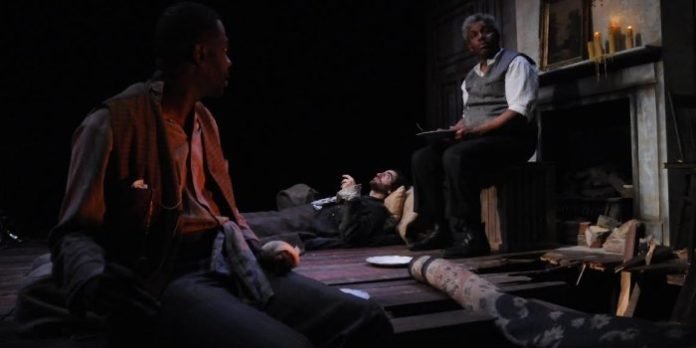Early in Matthew Lopez’s The Whipping Man you know the world has changed, or at least that of the American south, as former slave Simon stiffens at the directions being provided by one of his former masters: “All these things you’re telling me to do, by rights now you need to be asking me to do”. Such is the basis for a sometimes potent exploration of life after slavery in Lopez’s story of family, freedom and faith.
Returning to his family home just days after the end of the Civil War, Caleb DeLeon finds the home empty except for the two men who were once his family’s slaves. Shot in the leg a week ago and now ravaged by gangrene, Caleb’s only hope for life is to have it amputated. Refusing to be taken to the local hospital, the gruesome undertaking is carried out by Simon with assistance from the other former family slave, John. The tables are turned as Caleb is tended by the two as he lies recuperating on the floor of the family home, itself ravaged by war, and deep family secrets are revealed, designed to help with the emotional healing alongside the physical.
Problem is those secrets begin to feel contrived and intended only to help get the characters to their next big revelation. The result is an ebb and flow to the proceedings that has the ability to seductively draw you in, but just as quickly push you away; the result is an unevenness that never quite allows you to fully embrace the new world order that these three men find themselves.
Carl Kennedy brings a wonderfully nuanced performance as John, the younger of the two slaves. His anger is tempered with fear, and even as he admonishes his former master (“War’s over. You lost. We won.”), he weathers his character’s resentment and grief with a hopeful energy. There is a moment of true theatricality, as he talks of his encounter with the unseen title character, which is simply breathtaking.
Tom Pickett gives an equally strong performance as Simon, but it is in the moments of the play’s spiritual context that he finds his biggest strength. As he prepares for the Seder, the joy and belief he has found within his adopted religion seems to wipe away almost everything else. It is through Simon that Lopez connects the meaning behind the Seder ritual and the world in which the three men find themselves today. There is a certain melancholy to Pickett’s performance that is underlined by a beautiful story of a chance meeting with his own deliverer, President Lincoln.
As the returning son, Giovanni Mocibob has the toughest job lying on the floor unable to move for most of the play. Where it would be easy for the role to become a single note of resentment, Mocibob never allows his character to wallow in self-pity.
Director Anthony F Ingram is restricted somewhat by Drew Facey’s gorgeously realized representation of the destroyed family home. With its large gaping holes in the raised floor, the build is stunning, but turns the already tiny Pacific Theatre space smaller. Lighting designer Lauchlin Johnston does wonders with the low light necessary to give a sense of time and place, but the ambitious dream sequence is more distracting than innovative.
While The Whipping Man may not consistently pull you into its world, it remains a fascinating piece of historical fiction. That it still resonates is strangely comforting, and equally chilling.
The Whipping Man by Matthew Lopez. Directed by Anthony F. Ingram. A Pacific Theatre productions. On stage at Pacific Theatre (1440 12 Ave West, Vancouver) until March 21. Visit https://pacifictheatre.org for tickets and information.

